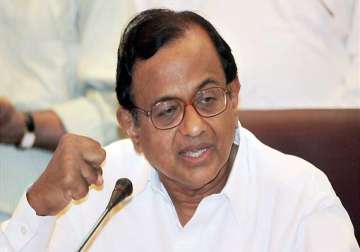New Delhi, Feb 24: Breaking his silence over stiff opposition to his pet project NCTC, Home Minister P Chidambaram today wrote to 10 non-Congress Chief Ministers, saying countering terrorism is a shared responsibility and Centre will continue to work with states to fight the menace.
In identical letters to the Chief Ministers, including West Bengal's Mamata Banerjee, Chidambaram said the Union Home Secretary would convene a meeting of the police chiefs of all states to discuss in detail the scope and functions of the National Counter Terrorism Centre, whose setting up was strongly opposed by them.
“All of us are agreed that terrorism is a grave threat to our country and our way of life. Countering terrorism is, therefore, a shared responsibility,” he said in his letter to Chief Ministers of Odisha, Bihar, Gujarat, West Bengal, Tamil Nadu, Himachal Pradesh, Jharkhand, Karnataka, Madhya Pradesh and Tripura.
The Home Minister's letter came after Prime Minister Manmohan Singh asked him to address the concerns of the Chief Ministers who lodged strong protests complaining that the Central government was going to set up the NCTC without any consultation with the state governments.
Some of them also complained that the anti-terror body will hurt the country's federal structure and infringe on powers of the state government.
The Home Minister said the intention of the Central government was to continue to work with the state governments in order to meet the challenge of terrorism and for this purpose the Unlawful Activities (Prevention) Act was amended in 2004 and 2008 through joint efforts.
“I have asked the Home Secretary to call a meeting of the Directors General of Police and the heads of the Anti-Terrorists Organisations/Forces of the state governments and discuss in detail the scope and functions of the NCTC.
Chidambaram said he had been asked by the Prime Minister to address the concerns expressed by them and to consult with them on this issue.
“..I am sure, you will agree (it) is a matter of national importance and should be kept above party politics,” he said.
The Home Minister attached a note along with the letter where he elaborated the genesis, objectives, structure and powers of the NCTC and requested the Chief Ministers to carefully consider it.
In the note, the Home Minister said that a body mandated to deal with counter terrorism must have, in certain circumstances, an operational capability which is true of all counter terrorism bodies in the world.
“When engaged in counter terrorism operations, the officers must have the power to arrest and the power to search which are the bare minimum powers that would be necessary,” he said.
Besides, the powers conferred under Section 43(A) of the UA(P) Act must be read with the duty under Section 43 (B) to produce the person or article without unnecessary delay before the nearest police station (which will be under the state government), and the SHO of the police station will take further action in accordance with the provisions of the CrPC, he said.
Section 43 (A) dealing with the powers to arrest and search is a major irritant for the Chief Ministers as they believe that it would infringe on the state's powers.
Latest India News
